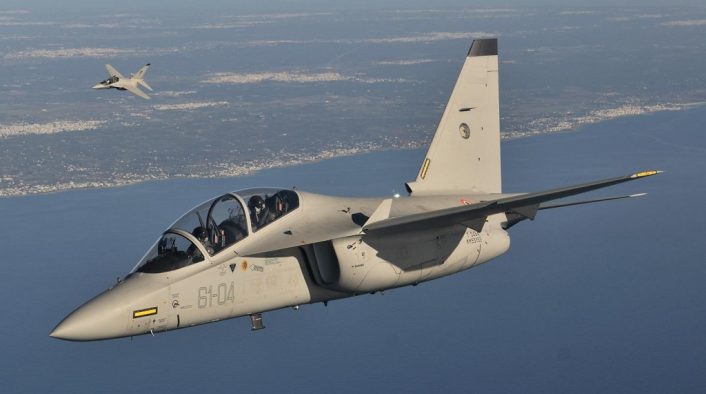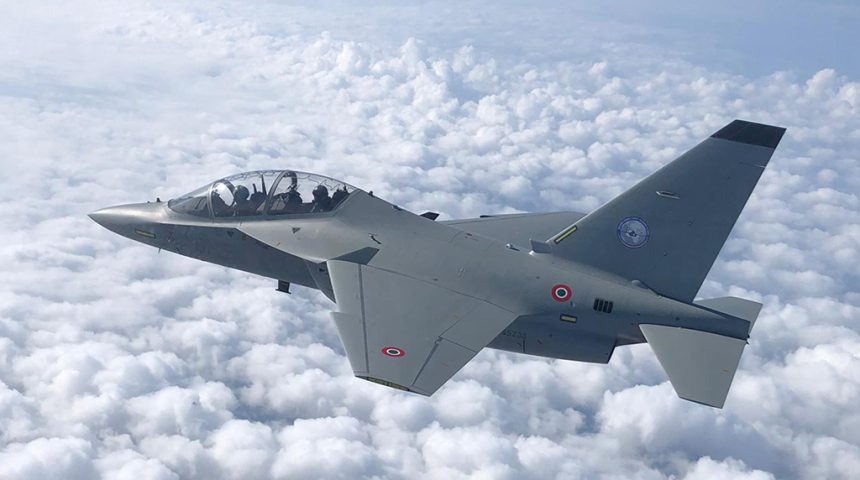Two German Air Force pilots have joined Qatari pilots at the Italian Flight Training School (IFTS) in Italy.
The new International Flight Training School (IFTS) is a joint venture between the Italian Air Force and Leonardo. Currently located at the 61° Stormo (Wing) at Galatina Air Base, in southeastern Italy but about to relocate to Decimomannu Air Base, Sardinia, (where a groundbreaking ceremony was held in December 2020 to mark the beginning of the construction works of a modern flight training campus), the initiative is an example of strategic partnership between the military and the industry, set to become an international benchmark for military pilots’ training. There’s a growing demand for training by partner nations most of those are simply not equipped with “domestic” solutions to prepare their pilots for 4th and 5th generation aircraft.
The evolution of front line combat aircraft that need to operate in a hi-tech airspace using new generation avionics while employing PGMs (Precision Guided Munitions), EW (Electronic Warfare) suites and several hi-tech sensors, has called for a complete redesign of the training syllabus: modern pilots need to put more focus on the management of the onboard systems rather than the handling of the aircraft. Today and tomorrow’s pilots need to exploit the capabilities of their aircraft, so that they can operate in complex, contested, high-threat/high performance scenarios. In order to develop the information management skills of future pilots before they are assigned to the OCUs (Operational Conversion Units), student pilots need to train on advanced trainers equipped with glass cockpit, touch screens, radar, multiple datalinks, LVC (Live Virtual Constructive) interfaces, Voice Commands, Helmet Mounted Display and the plethora of modern sensors they will find in the Eurofighter Typhoon, the F/A-18 Hornet, the Dassault Rafale or the F-35 Lightning II.
The M-346 is, if not the most, one of the most advanced jet trainers around, offering all those features required to prepare future combat pilots for +4th and 5th gen. fighters, and the IFTS combines the knowledge and tradition of the Italian Air Force with the expertise and leadership in training platforms of Leonardo to offer both Italian and foreign pilots, Phase IV or Lead-In to Fighter Training (LIFT) using the M-346 Master aircraft and its GBTS (Ground-Based Training System) as well as the advanced full-mission simulator jointly developed by Leonardo and CAE.

The IFTS will operate a fleet of 22 M-346 jets: four Leonardo owned aircraft (the latter of those was delivered in October 2019) and 18 Italian Air Force T-346As (as the M-346 is designated by the Italian MOD Mission Design Series). Training will be delivered by a cadre of active-duty Italian Air Force and highly experienced international former military instructor pilots.
A new IFTS campus is under construction at Decimomannu Air Force Base: in the will be a flight academy capable of hosting students and technical staff, in addition to accommodation, recreational areas, a cafeteria, sports facilities.An entire building will be home to the GBTS, with classrooms and the installation of a modern training system, which is based on the latest generation of simulation devices. The average weather (mostly suitable for the flying activity) and the availability of several training areas made “Deci” the perfect place to host the IFTS when it will be in full operation.
Some foreign attendees are already attending IFTS training classes. Two Qatar Emiri Air Force (QEAF) pilots have already reached the final stage of the LIFT course, while two German Air Force pilots have recently begun their advanced flight training (or Phase IV) at Lecce Air Base.
According to joint Italian Air Force – Leonardo press release, the GAF pilots have joined the IFTS in accordance wtih an agreement signed by the Lt. Gen. Alberto Rosso, Chief of Staff of the Italian Air Force, and Maj. Gen. Klement, Commander of the Flying Units of the German Air Force.
“The training provided to the German pilots follows activities undertaken by the Qatar Emiri Air Force’s pilots, which commenced at IFTS in June this year. The Qatar Emiri Air Force pilots have completed the synthetic training modules both on the Partial Task Trainer (PTT) and the Full Mission Simulator (FMS) – two of the ultra-technological simulator devices integrated into the training system based on the T-346A aircraft. The pilots have now begun the in-flight instructional training. The agreement between the Italian and German Air Forces for advanced flight training services foresees the possibility to extend the collaboration to Phase III in the future, which brings the cadet to the military pilot qualification. The Qatari Air Force’s and now German Air Force’s decision to send their pilots to train in Italy at the IFTS provides clear evidence of the recognition of the Italian training system and testifies the potential of this ambitious international project.”









